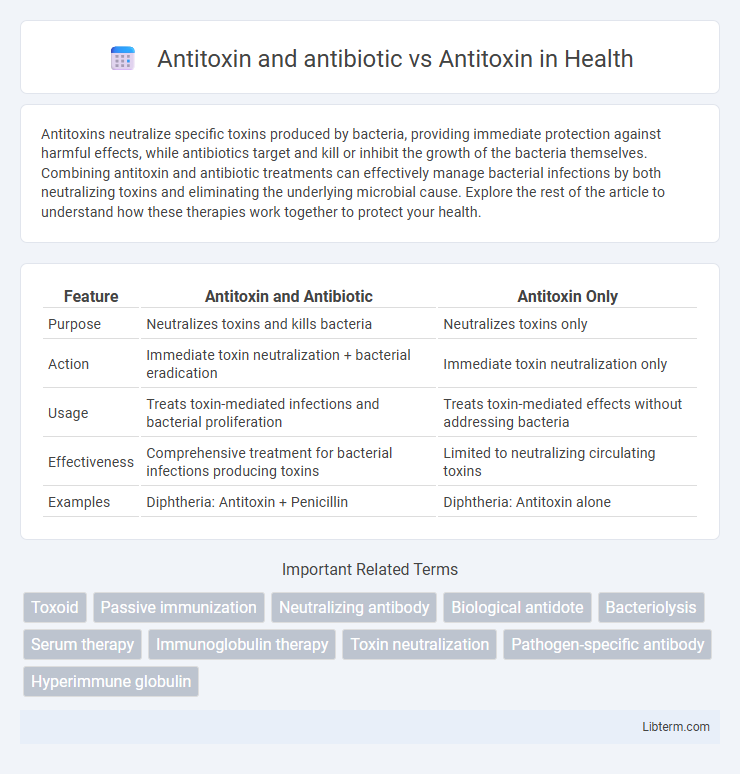Antitoxins neutralize specific toxins produced by bacteria, providing immediate protection against harmful effects, while antibiotics target and kill or inhibit the growth of the bacteria themselves. Combining antitoxin and antibiotic treatments can effectively manage bacterial infections by both neutralizing toxins and eliminating the underlying microbial cause. Explore the rest of the article to understand how these therapies work together to protect your health.
Table of Comparison
| Feature | Antitoxin and Antibiotic | Antitoxin Only |
|---|---|---|
| Purpose | Neutralizes toxins and kills bacteria | Neutralizes toxins only |
| Action | Immediate toxin neutralization + bacterial eradication | Immediate toxin neutralization only |
| Usage | Treats toxin-mediated infections and bacterial proliferation | Treats toxin-mediated effects without addressing bacteria |
| Effectiveness | Comprehensive treatment for bacterial infections producing toxins | Limited to neutralizing circulating toxins |
| Examples | Diphtheria: Antitoxin + Penicillin | Diphtheria: Antitoxin alone |
Introduction to Antitoxin and Antibiotics
Antitoxins are antibodies specifically designed to neutralize toxins produced by bacteria, providing targeted protection against toxin-mediated diseases such as diphtheria and tetanus. Antibiotics, on the other hand, are chemical agents that inhibit the growth of or kill bacteria directly, addressing a broad spectrum of bacterial infections by targeting essential bacterial functions. Understanding the distinct mechanisms of antitoxins and antibiotics is crucial for effective treatment strategies in infectious disease management.
What are Antitoxins?
Antitoxins are specialized antibodies that neutralize specific bacterial toxins, preventing or mitigating their harmful effects in the body. Unlike antibiotics, which kill or inhibit the growth of bacteria, antitoxins specifically target the toxins produced by bacteria without affecting the bacteria themselves. Antitoxins are commonly used to treat diseases such as diphtheria, tetanus, and botulism by binding to and neutralizing the potent exotoxins responsible for symptoms.
How Antibiotics Work
Antibiotics work by targeting specific bacterial processes such as cell wall synthesis, protein production, or DNA replication, effectively killing or inhibiting bacterial growth. Unlike antitoxins, which neutralize toxins produced by pathogens, antibiotics directly combat the bacteria responsible for infections. This distinction highlights the critical role of antibiotics in treating bacterial diseases by eliminating the infection source rather than just counteracting toxins.
Antitoxin vs Antibiotic: Mechanism of Action
Antitoxins neutralize specific bacterial toxins by binding directly to the toxin molecules, preventing their interaction with host cells, whereas antibiotics target the bacteria itself by inhibiting essential processes such as cell wall synthesis or protein production. The mechanism of action of antitoxins involves immunological intervention to inactivate toxins, making them effective against toxin-mediated symptoms without affecting bacterial growth. In contrast, antibiotics reduce or eliminate bacterial populations, addressing the underlying infection but not neutralizing preformed toxins.
Key Differences Between Antitoxin and Antibiotic
Antitoxins neutralize specific toxins produced by pathogens, directly targeting the harmful substances rather than the microorganisms themselves, whereas antibiotics inhibit or kill bacteria to stop infections. Antibiotics are effective against a broad range of bacterial infections, including those caused by both Gram-positive and Gram-negative bacteria, while antitoxins are used primarily for toxin-mediated diseases such as tetanus or diphtheria. The mechanism of action differs significantly as antitoxins are usually antibodies or antibody fragments, providing passive immunity, whereas antibiotics are chemical agents that disrupt vital bacterial functions.
Clinical Applications of Antitoxins
Antitoxins are immunological agents specifically designed to neutralize toxins produced by pathogens, making them crucial in treating toxin-mediated diseases such as diphtheria and tetanus. Antibiotics target bacterial infections by inhibiting bacterial growth or killing bacteria, but they do not neutralize toxins already circulating in the body. Clinical applications of antitoxins include emergency treatment of toxin exposure and toxin-related illnesses where rapid neutralization is essential to prevent severe complications or mortality.
Advantages of Antitoxin Therapies
Antitoxin therapies provide targeted neutralization of specific toxins, offering rapid relief from toxin-mediated damage without disrupting beneficial microbiota, unlike antibiotics which act broadly against bacteria. Antitoxins reduce the risk of antibiotic resistance by directly binding and inactivating toxins, a critical advantage in treating diseases such as diphtheria and botulism. Their specificity allows for immediate mitigation of symptoms and prevention of toxin-induced complications, improving patient outcomes in toxin-related infections.
Limitations and Risks of Antibiotics
Antibiotics effectively target bacterial infections by killing or inhibiting bacterial growth, but they face limitations such as antibiotic resistance, which reduces their efficacy over time and leads to treatment failures. Overuse and misuse of antibiotics can disrupt the body's natural microbiome, causing secondary infections and adverse side effects like gastrointestinal disturbances. In contrast, antitoxins specifically neutralize toxins produced by pathogens without disrupting the microbiome, presenting a lower risk of resistance development and preserving normal physiological functions.
When to Use Antitoxin Instead of Antibiotics
Antitoxins are specifically used to neutralize toxins produced by certain bacteria, such as in diphtheria or botulism, where immediate toxin neutralization is critical for patient survival. Antibiotics target the bacterial infection itself by killing or inhibiting bacterial growth but do not neutralize toxins already present in the body. Use antitoxins when rapid toxin neutralization is necessary to prevent or treat toxin-mediated damage, especially before antibiotics can effectively reduce bacterial load.
Future Perspectives in Antitoxin and Antibiotic Treatments
Future perspectives in antitoxin and antibiotic treatments emphasize the development of targeted therapies combining monoclonal antibodies with broad-spectrum antibiotics to enhance efficacy against resistant bacterial strains. Advances in biotechnology enable the engineering of antitoxins with improved specificity and stability, potentially reducing the reliance on traditional antibiotics and mitigating resistance. Integration of novel antitoxin-antibiotic conjugates and personalized medicine approaches promises to revolutionize treatment protocols for toxin-mediated infectious diseases.
Antitoxin and antibiotic Infographic

 libterm.com
libterm.com